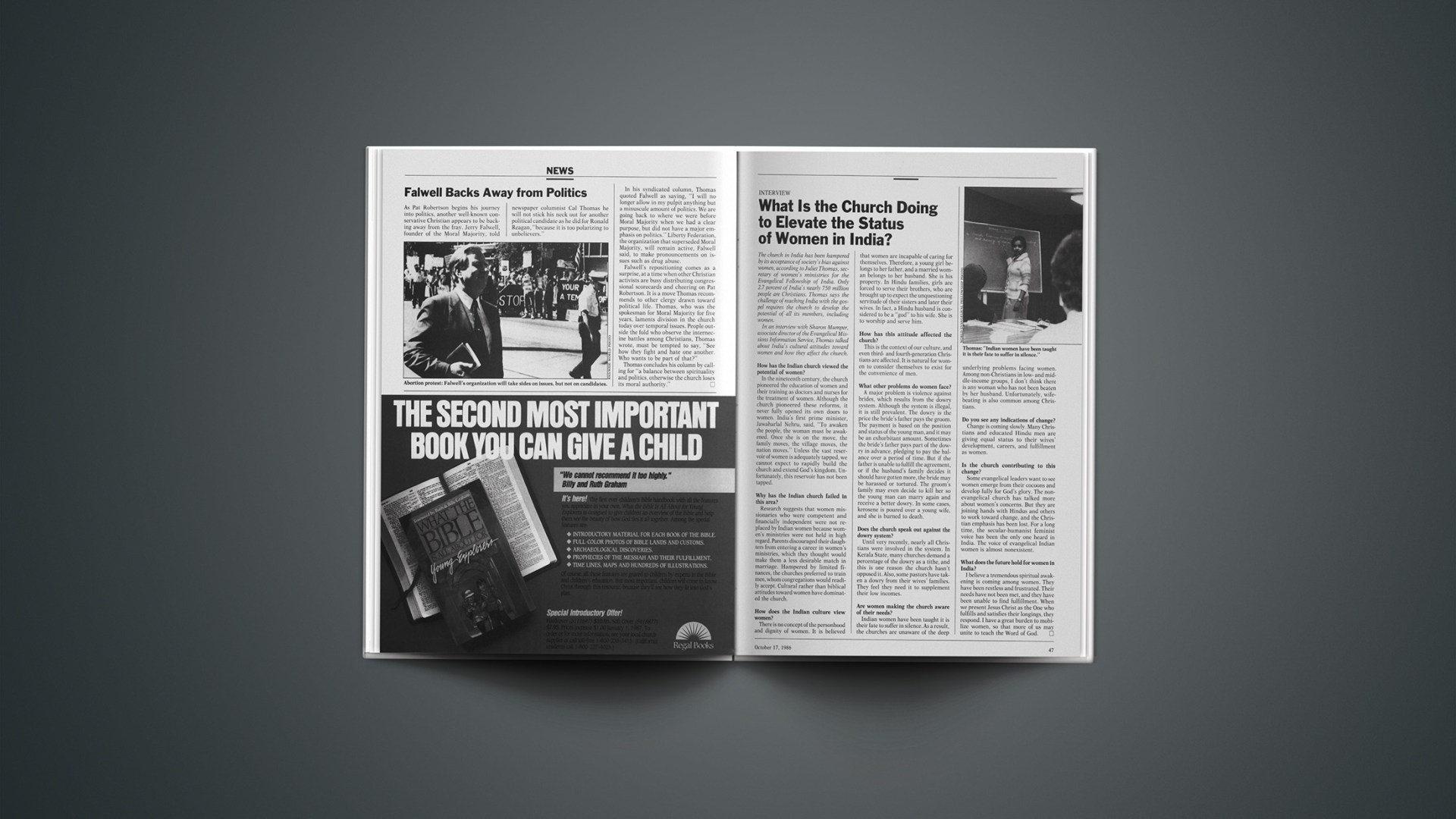The church in India has been hampered by its acceptance of society’s bias against women, according to Juliet Thomas, secretary of women’s ministries for the Evangelical Fellowship of India. Only 2.7 percent of India’s nearly 750 million people are Christians. Thomas says the challenge of reaching India with the gospel requires the church to develop the potential of all its members, including women.
In an interview with Sharon Mumper, associate director of the Evangelical Missions Information Service, Thomas talked about India’s cultural attitudes toward women and how they affect the church.
How has the Indian church viewed the potential of women?
In the nineteenth century, the church pioneered the education of women and their training as doctors and nurses for the treatment of women. Although the church pioneered these reforms, it never fully opened its own doors to women. India’s first prime minister, Jawaharlal Nehru, said, “To awaken the people, the woman must be awakened. Once she is on the move, the family moves, the village moves, the nation moves.” Unless the vast reservoir of women is adequately tapped, we cannot expect to rapidly build the church and extend God’s kingdom. Unfortunately, this reservoir has not been tapped.
Why has the Indian church failed in this area?
Research suggests that women missionaries who were competent and financially independent were not replaced by Indian women because women’s ministries were not held in high regard. Parents discouraged their daughters from entering a career in women’s ministries, which they thought would make them a less desirable match in marriage. Hampered by limited finances, the churches preferred to train men, whom congregations would readily accept. Cultural rather than biblical attitudes toward women have dominated the church.
How does the Indian culture view women?
There is no concept of the personhood and dignity of women. It is believed that women are incapable of caring for themselves. Therefore, a young girl belongs to her father, and a married woman belongs to her husband. She is his property. In Hindu families, girls are forced to serve their brothers, who are brought up to expect the unquestioning servitude of their sisters and later their wives. In fact, a Hindu husband is considered to be a “god” to his wife. She is to worship and serve him.
How has this attitude affected the church?
This is the context of our culture, and even third-and fourth-generation Christians are affected. It is natural for women to consider themselves to exist for the convenience of men.
What other problems do women face?
A major problem is violence against brides, which results from the dowry system. Although the system is illegal, it is still prevalent. The dowry is the price the bride’s father pays the groom. The payment is based on the position and status of the young man, and it may be an exhorbitant amount. Sometimes the bride’s father pays part of the dowry in advance, pledging to pay the balance over a period of time. But if the father is unable to fulfill the agreement, or if the husband’s family decides it should have gotten more, the bride may be harassed or tortured. The groom’s family may even decide to kill her so the young man can marry again and receive a better dowry. In some cases, kerosene is poured over a young wife, and she is burned to death.
Does the church speak out against the dowry system?
Until very recently, nearly all Christians were involved in the system. In Kerala State, many churches demand a percentage of the dowry as a tithe, and this is one reason the church hasn’t opposed it. Also, some pastors have taken a dowry from their wives’ families. They feel they need it to supplement their low incomes.
Are women making the church aware of their needs?
Indian women have been taught it is their fate to suffer in silence. As a result, the churches are unaware of the deep underlying problems facing women. Among non-Christians in low-and middle-income groups, I don’t think there is any woman who has not been beaten by her husband. Unfortunately, wifebeating is also common among Christians.
Do you see any indications of change?
Change is coming slowly. Many Christians and educated Hindu men are giving equal status to their wives’ development, careers, and fulfillment as women.
Is the church contributing to this change?
Some evangelical leaders want to see women emerge from their cocoons and develop fully for God’s glory. The non-evangelical church has talked more about women’s concerns. But they are joining hands with Hindus and others to work toward change, and the Christian emphasis has been lost. For a long time, the secular-humanist feminist voice has been the only one heard in India. The voice of evangelical Indian women is almost nonexistent.
What does the future hold for women in India?
I believe a tremendous spiritual awakening is coming among women. They have been restless and frustrated. Their needs have not been met, and they have been unable to find fulfillment. When we present Jesus Christ as the One who fulfills and satisfies their longings, they respond. I have a great burden to mobilize women, so that more of us may unite to teach the Word of God.










